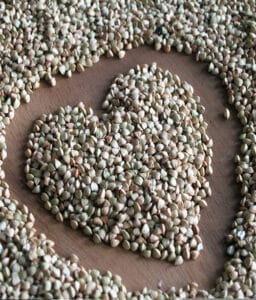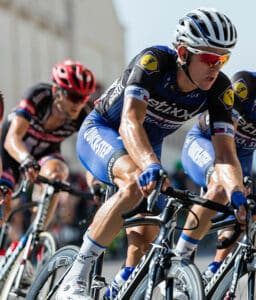Sports nutrition
What is sports nutrition?
Sports nutrition is a nutritional plan developed for EACH SPECIFIC ATHLETE, which provides all the nutrients and fluids necessary for the specific body so that it functions at the maximum possible level. This focus on improving performance through diet is what sets sports nutrition apart from other areas of nutrition.
Sports nutrition is a rapidly growing field of research and practice. Research is mainly carried out in the following directions:
- How does exercise affect protein utilization in the body?
- What is the optimal time and composition of meals to improve anabolic processes in an athlete's body?
- How important are essential amino acids?
- What is the role and use of carbohydrates during sports activities?
- How does ribose affect performance in high-intensity training?
- How does creatine affect the performance of athletes?
- Proper hydration and its effect on athletic performance.
However, nutrients are only one of the components of sports nutrition. Understanding human physiology and metabolism, exercise physiology, sports psychology, nutritional supplements, and basic knowledge about a particular sport is also very important for making a nutrition plan suitable for a particular athlete.
Basic components of sports nutrition
We get the energy we need to maintain life and physical activity from what we eat and drink. These nutrients provide the energy needed for the optimal functioning of the body.
Carbohydrates
Carbohydrates is the most important source of energy for our body. The digestive system breaks down carbohydrates into glucose, which in turn provides energy for our body's cells, tissues, and organs.
Carbohydrates are divided into simple and complex carbohydrates:
- Simple carbohydrates, which are the main component of all sweets and include sugars that occur naturally in foods such as fruits, vegetables, and milk;
- Complex carbohydrates, such as whole grains, potatoes, most vegetables...
Protein
Protein is the most important nutrient because, unlike fats and carbohydrates, it cannot be replaced by other nutrients.
In the digestive tract, proteins are broken down into amino acids, which the body uses as "building blocks" for the synthesis of new compounds as needed. Proteins are the construction blocks of our body.
If there is a lack of protein in the diet, the body's growth (muscle formation), regeneration of worn-out tissues, and the body's ability to resist the harmful effects of the environment are impaired.
With heavy physical exertion or fasting, the body can also use proteins as an energy source (for athletes, this means a decrease in muscle mass).
Proteins are divided into:
- In simple proteins (proteins), the molecules of which consist only of amino acids, for example - albumins, which are found in both animal and vegetable products - egg white (ovoalbumin), milk (lactoalbumin), etc. Simple proteins are further grouped according to their solubility in various solvents and particle shape;
- In complex proteins (proteids), the molecules of which consist of both amino acids and other substances, for example, casein in milk or bitelin in egg yolk. Complex proteins are divided into:
On the other hand, food products containing proteins are divided into:
- Complete protein sources that contain all the amino acids the body needs. These are mainly animal products such as meat, fish, poultry, and dairy products.
- Incomplete protein sources that lack one or more essential amino acids. These are mainly plant-based products, such as beans (soybeans are the only beans containing all nine essential amino acids), seeds, and nuts...
Fat
Fats play an essential role in the human body. Fats are both a source of energy and ensure the absorption of fat-soluble vitamins, are necessary for the development of some hormones, help maintain the functions of the immune system, and protect our organs...
Fats are divided into:
- Unsaturated fats that come from vegetable sources, such as olive oil and nuts;
- Saturated fats that come from animal products, such as red meat and dairy products with a high-fat content (butter, cream).
Goals of a sports nutrition plan
A sports nutrition plan is always created to help a specific person achieve his goals, for example - increasing muscle mass, body recomposition, or improving athletic performance, etc.
Research results show that the optimal type of diet, calorie intake, time of intake of nutrients and fluids, and the choice of dietary supplements are individual for each person.
Therefore, each person and each of these goals requires a different nutritional program.
A nutritional plan for increasing athletic performance
Studies show that to optimize athletic performance, a balanced nutrition plan should include a sufficient amount of calories and macronutrients.
The body will use carbohydrates or fat as the main source of energy, depending on the intensity and duration of the exercise. Insufficient calorie intake can reduce the effectiveness of training and hinder performance.
Adults who exercise three to four times a week can usually meet their nutritional needs with a normal, healthy diet. Elite athletes who train intensely five to six times a week will need significantly more nutrients to provide their body with everything it needs.
For example, according to research, the energy consumption of cyclists participating in the Tour de France is about 12,000 calories per day.
Carbohydrates is the main source of energy. General guidelines for carbohydrate intake are based on body weight, height, and training characteristics. The need for carbohydrates in the daily diet can vary from 45 to 65 percent of the total amount of calories consumed with food.
Protein are responsible for muscle growth and regeneration. Sufficient protein helps maintain a positive nitrogen balance in the body, which is vital for muscle tissue. Protein requirements can vary widely, from 0.8 g to 2 g per kilogram of body weight per day.
Fat helps maintain energy balance, regulates hormones, and restores muscle tissue. Omega-3 and omega-6 are essential fatty acids that are particularly important in sports nutrition. Research shows that athletes should consume about 30 percent of their total dietary calories from "healthy" fats.
Diet plan to increase endurance
Endurance is the body's ability to withstand prolonged exertion (to provide the organism with the amount of energy necessary for this effort) and recover from injuries or fatigue.
Endurance training is defined as moderate to high-intensity exercises for one to three hours a day. They are characterized by high energy consumption, so the consumption of carbohydrates is very important. According to research, the required carbohydrate intake for endurance training ranges from 6 to 10 g per kilogram of body weight per day.
Fat is used as a secondary source of energy during long-term workouts.
Athletes engaged in endurance sports are more at risk of dehydration, so fluids and electrolytes lost with sweat should be replenished with sports drinks to ensure maximum performance.
Diet plan to increase strength
Strength training programs are designed to gradually increase the strength of skeletal muscles. Strength training is high-intensity work, therefore, a sufficient amount of all macronutrients is necessary for muscle development.
In order to maintain and increase muscle mass, protein intake is especially important. Research shows that protein requirements can range from 1.2g to 3.1g per kilogram of body weight per day.
A nutrition plan to increase performance in competitions
Preparation for competitions is different for each sport, and accordingly, the requirements for the nutrition plan are also different. For example, in strength sports, athletes seek to increase muscle mass and/or body size. Long-distance runners focus on reducing body weight/fat in order to maximize their body's performance during the marathon.
Accordingly, the best nutrition strategy is determined by the specific sport and the goals set, and nutrition planning before and after training is individual for each athlete.
Hydration and athlete performance
We all lose water through sweating and breathing, but athletes lose a lot of water and a significant amount of sodium during intense workouts. Adequate hydration and replenishment of electrolytes are necessary both for their health and for athletic performance.
Dehydration refers to the process of losing body water. A fluid deficit of more than 2 percent of body weight can compromise both athletic performance and cognitive ability.
Rehydration with water and sodium-containing sports drinks depends on the type of sport, the athlete, and the type of competition or training.
Lack of adequate hydration in athletes can cause the following consequences:
- Hypohydration (dehydration);
- Hypovolemia (reduced plasma/blood volume);
- Hyponatremia (low blood sodium/water intoxication).
Sports nutrition and nutritional supplements
The use of dietary supplements is a personal choice and remains controversial, both for ethical reasons and because of insufficient regulation of dietary supplements (manufacturers/marketers of dietary supplements are not required to prove the efficacy and safety of their products).
Independent research (clinical studies without major financial support from interested parties) on dietary supplements is very limited.
A general classification of nutritional supplements could be as follows:
- Sports food (convincing, scientifically proven effectiveness) – sports drinks, bars and gels, electrolyte supplements, protein supplements, liquid meal supplements (e.g. macronutrient shakes);
- Nutritional supplements (supported by studies, but additional research is needed) – food polyphenols, antioxidants, tastants (menthol, quinine...), collagen, carnitine, ketone supplements, fish oils, curcumin, N-acetylcysteine;
- Medical supplements (studies do not confirm benefits or studies have not been conducted) – iron, magnesium, calcium, vitamins, omega-3 fatty acids, probiotics, HMB, BCAA/Leucine, Alpha lipoic acid, phosphate, tyrosine;
- Performance enhancers (prohibited or at high risk of contamination with substances that may cause a positive doping test):
- Stimulants such as ephedrine, strychnine, sibutramine, methylhexanamine (DMAA), 1,3-dimethylbutylamine (DMBA), other herbal stimulants;
- Prohormones and promoters of hormone synthesis, for example – androstenedione, 19-norandrostenion/ol, Tribulus terrestris and other testosterone enhancers, maca root powder;
- Growth hormone releasing peptides, such as GHRP-1 and GHRP-2, CJC-1293 and CJC-1295;
- Beta-2 agonists, for example – higenamine;
- Selective Androgen Receptor Modulators (SARMS), for example – andarin, ostarin, ligandrol;
- Metabolic modulators such as – GW1516 (Cardarine).
Sports nutrition for young people
Their bodies are still developing, so a balanced diet with all the necessary nutrients (proteins, carbohydrates, lipids, vitamins and minerals) is even more important.
Muscle strength and growth are optimized by carefully balancing protein and carbohydrate intake. In addition, the right amount of calcium, iron, vitamin D and fluids should be determined according to the type of activity.
Sports nutrition in special conditions
There are also nutritional guidelines for specific athlete groups and training/competition environments.
Athlete vegetarians
Vegetarian sports nutrition contains a lot of plant proteins, fruits, vegetables, whole grain products, and nuts. It may be nutritionally adequate, but there is insufficient evidence for the long-term performance of vegetarian athletes.
Training/competing high above sea level
Athletes training at high altitudes needs special training and nutrition. The higher, the less oxygen — that's why it is so important to increase the number of red blood cells to provide the body with more oxygen. An important part of the diet will be foods rich in iron.
At high altitudes, the risk of various diseases is also increased, so the menu should include foods with a high content of antioxidants and proteins.
The hydration status of each athlete will be different and should be monitored individually.
Hot environment
Athletes who train/compete in hot conditions are at increased risk of heat diseases, which can lead to health complications. The water-electrolyte balance is very important for these athletes, so the hydration of the body should be the focus of attention.
Cold environment
The main problems when exercising in the cold are adequate hydration and body temperature. Thinner athletes are at greater risk of hypothermia, so these athletes require a different amount of calories and carbohydrates when training in the cold.
Digestive disorders and nutritional deficiencies
Digestive disorders are not uncommon in athletes. Many athletes need to maintain low body weight and at the same time promote muscle development. Constant competition can cause psychological and physical stress in an athlete, which, in turn, can lead to improper/unhealthy nutrition.
The most common eating disorders among athletes are:
It is obvious that the nutritional needs of these people differ significantly from the nutritional needs of healthy athletes. In such cases, the focus should be on treating an eating disorder rather than improving athletic performance.
Athletes, in order to adjust their weight, often limit the number of calories consumed and exclude even whole food groups, which can lead to a significant deficiency of trace elements. Studies show that the most common are:
- Iron deficiency, which can impair muscle function and jeopardize athletic performance;
- Vitamin D deficiency, which can cause a decrease in bone strength and a decrease in muscle metabolic functions;
- Calcium deficiency, which can impair the regeneration of bone tissue, reduce nerve conduction and regulation of muscle contractions.
Key takeaways
Nutrition plays an important role in improving your athletic performance. Whatever your goal, about 80 percent of success is created in the kitchen.
Proper, purposeful nutrition can help improve the quality of training, accelerate recovery after training and, as a result, improve athletic performance.
Nutrition and willpower make it possible to achieve your goals, regardless of whether you are training to improve your health or preparing for competitions at the highest level.
Sources:
Sports Nutrition: What the Future May Bring
Sports nutrition for young athletes
New strategies in sports nutrition to increase exercise performance
IOC consensus statement: dietary supplements and the high-performance athlete
ISSN exercise & sports nutrition review update: research & recommendations
Nutrition and Supplement Update for the Endurance Athlete: Review and Recommendations

Help to maintain this site, create interesting articles and delicious low-calorie recipes!
Share this article
Follow me on Facebook
I recommend reading these articles as well

Buckwheat and buckwheat diet
About buckwheat, buckwheat diets and its impact on our health, beauty and well-being.

5 Popular but surprisingly unhealthy diets
The promises of the most popular diets - how true and justified are they? What are the health risks associated with following these diets?

Sports nutrition
Nutrition is a key component of athletic performance. How does sports nutrition differ from the usual? How does it help to develop strength, endurance, and speed?

How to find time for cooking and exercise?
How to prioritise your health, organise your schedule and find time for both cooking and workouts?

